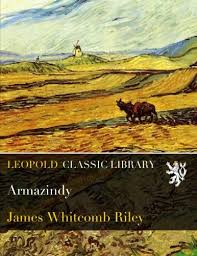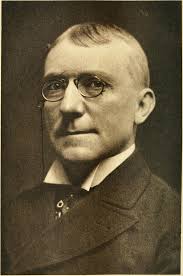Armazindy Page #3
James Whitcomb Riley poems book published in the 1894 book Armazindy and received very negative reviews that referred to poems like "The Little Dog-Woggy" and "Jargon-Jingle" as "drivel" and to Riley as a "worn out genius". Most of his growing number of critics suggested that he ignored the quality of the poems for the sake of making money.
O the old trundle-bed, where I wondering saw The stars through the window, and listened with awe To the sigh of the winds as they tremblingly crept Through the trees where the robin so restlessly slept: Where I heard the low, murmurous chirp of the wren, And the katydid listlessly chirrup again, Till my fancies grew faint and were drowsily led Through the maze of the dreams of the old trundle-bed. O the old trundle-bed! O the old trundle-bed! With its plump little pillow, and old-fashioned spread; Its snowy-white sheets, and the blankets above, Smoothed down and tucked round with the touches of love; The voice of my mother to lull me to sleep With the old fairy stories my memories keep Still fresh as the lilies that bloom o’er the head Once bowed o’er my own in the old trundle-bed. NATURAL PERVERSITIES I am not prone to moralize In scientific doubt On certain facts that Nature tries To puzzle us about,— For I am no philosopher Of wise elucidation, But speak of things as they occur, From simple observation. I notice little things—to wit:— I never missed a train Because I didn’t run for it; I never knew it rain That my umbrella wasn’t lent,— Or, when in my possession, The sun but wore, to all intent, A jocular expression. I never knew a creditor To dun me for a debt But I was “cramped” or “bu’sted”; or I never knew one yet, When I had plenty in my purse, To make the least invasion,— As I, accordingly perverse, Have courted no occasion. Nor do I claim to comprehend What Nature has in view In giving us the very friend To trust we oughtn’t to.— But so it is: The trusty gun Disastrously exploded Is always sure to be the one We didn’t think was loaded. Our moaning is another’s mirth,— And what is worse by half, We say the funniest thing on earth And never raise a laugh: ’Mid friends that love us overwell, And sparkling jests and liquor, Our hearts somehow are liable To melt in tears the quicker. We reach the wrong when most we seek The right; in like effect, We stay the strong and not the weak— Do most when we neglect.— Neglected genius—truth be said— As wild and quick as tinder, The more you seek to help ahead The more you seem to hinder. I’ve known the least the greatest, too— And, on the selfsame plan, The biggest fool I ever knew Was quite a little man: We find we ought, and then we won’t— We prove a thing, then doubt it,— Know everything but when we don’t Know anything about it. THE OLD SCHOOL-CHUM He puts the poem by, to say His eyes are not themselves to-day! A sudden glamour o’er his sight— A something vague, indefinite— An oft-recurring blur that blinds The printed meaning of the lines, And leaves the mind all dusk and dim In swimming darkness—strange to him! It is not childishness, I guess,— Yet something of the tenderness That used to wet his lashes when A boy seems troubling him again;— The old emotion, sweet and wild, That drove him truant when a child, That he might hide the tears that fell Above the lesson—“Little Nell.” And so it is he puts aside The poem he has vainly tried To follow; and, as one who sighs In failure, through a poor disguise Of smiles, he dries his tears, to say His eyes are not themselves to-day. WRITIN’ BACK TO THE HOME-FOLKS My dear old friends—It jes beats all, The way you write a letter So’s ever’ last line beats the first, And ever’ next-un’s better!— W’y, ever’ fool-thing you putt down You make so interestin’, A feller, readin’ of ’em all, Can’t tell which is the best-un. It’s all so comfortin’ and good, ’Pears-like I almost hear ye And git more sociabler, you know, And hitch my cheer up near ye And jes smile on ye like the sun Acrosst the whole per-rairies In Aprile when the thaw’s begun And country couples marries. It’s all so good-old-fashioned like To talk jes like we’re thinkin’, Without no hidin’ back o’ fans And giggle-un and winkin’, Ner sizin’ how each other’s dressed— Like some is allus doin’,— “Is Marthy Ellen’s basque be’n turned Er shore-enough a new-un!”— Er “ef Steve’s city-friend hain’t jes ‘A leetle kindo’-sorto’”— Er “wears them-air blame’ eye-glasses Jes ’cause he hadn’t ort to?”— And so straight on, dad-libitum, Tel all of us feels, someway, Jes like our “comp’ny” wuz the best When we git up to come ’way! That’s why I like old friends like you,— Jes ’cause you’re so abidin’.— Ef I wuz built to live “fer keeps,” My principul residin’ Would be amongst the folks ’at kep’ Me allus thinkin’ of ’em, And sorto’ eechin’ all the time To tell ’em how I love ’em.— Sich folks, you know, I jes love so I wouldn’t live without ’em, Er couldn’t even drap asleep But what I dreamp’ about ’em,— And ef we minded God, I guess We’d all love one another Jes like one famb’ly,—me and Pap And Madaline and Mother. THE BLIND GIRL If I might see his face to-day!— He is so happy now!—To hear His laugh is like a roundelay— So ringing-sweet and clear! His step—I heard it long before He bounded through the open door To tell his marriage.—Ah! so kind— So good he is!—And I—so blind! But thus he always came to me— Me, first of all, he used to bring His sorrow to—his ecstasy— His hopes and everything; And if I joyed with him or wept, It was not long the music slept,— And if he sung, or if I played— Or both,—we were the braver made. I grew to know and understand His every word at every call,— The gate-latch hinted, and his hand In mine confessed it all: He need not speak one word to me— He need not sigh—I need not see,— But just the one touch of his palm, And I would answer—song or psalm. He wanted recognition—name— He hungered so for higher things,— The altitudes of power and fame, And all that fortune brings: Till, with his great heart fevered thus, And aching as impetuous, I almost wished sometimes that he Were blind and patient made, like me. But he has won!—I knew he would.— Once in the mighty Eastern mart, I knew his music only could Be sung in every heart! And when he proudly sent me this From out the great metropolis, I bent above the graven score And, weeping, kissed it o’er and o’er.— And yet not blither sing the birds Than this glad melody,—the tune As sweetly wedded with the words As flowers with middle-June; Had he not told me, I had known It was composed of love alone— His love for her.—And she can see His happy face eternally!— While I—O God, forgive, I pray!— Forgive me that I did so long To look upon his face to-day!—
Translation
Translate and read this book in other languages:
Select another language:
- - Select -
- 简体中文 (Chinese - Simplified)
- 繁體中文 (Chinese - Traditional)
- Español (Spanish)
- Esperanto (Esperanto)
- 日本語 (Japanese)
- Português (Portuguese)
- Deutsch (German)
- العربية (Arabic)
- Français (French)
- Русский (Russian)
- ಕನ್ನಡ (Kannada)
- 한국어 (Korean)
- עברית (Hebrew)
- Gaeilge (Irish)
- Українська (Ukrainian)
- اردو (Urdu)
- Magyar (Hungarian)
- मानक हिन्दी (Hindi)
- Indonesia (Indonesian)
- Italiano (Italian)
- தமிழ் (Tamil)
- Türkçe (Turkish)
- తెలుగు (Telugu)
- ภาษาไทย (Thai)
- Tiếng Việt (Vietnamese)
- Čeština (Czech)
- Polski (Polish)
- Bahasa Indonesia (Indonesian)
- Românește (Romanian)
- Nederlands (Dutch)
- Ελληνικά (Greek)
- Latinum (Latin)
- Svenska (Swedish)
- Dansk (Danish)
- Suomi (Finnish)
- فارسی (Persian)
- ייִדיש (Yiddish)
- հայերեն (Armenian)
- Norsk (Norwegian)
- English (English)
Citation
Use the citation below to add this book to your bibliography:
Style:MLAChicagoAPA
"Armazindy Books." Literature.com. STANDS4 LLC, 2025. Web. 6 Mar. 2025. <https://www.literature.com/book/armazindy_946>.








Discuss this Armazindy book with the community:
Report Comment
We're doing our best to make sure our content is useful, accurate and safe.
If by any chance you spot an inappropriate comment while navigating through our website please use this form to let us know, and we'll take care of it shortly.
Attachment
You need to be logged in to favorite.
Log In